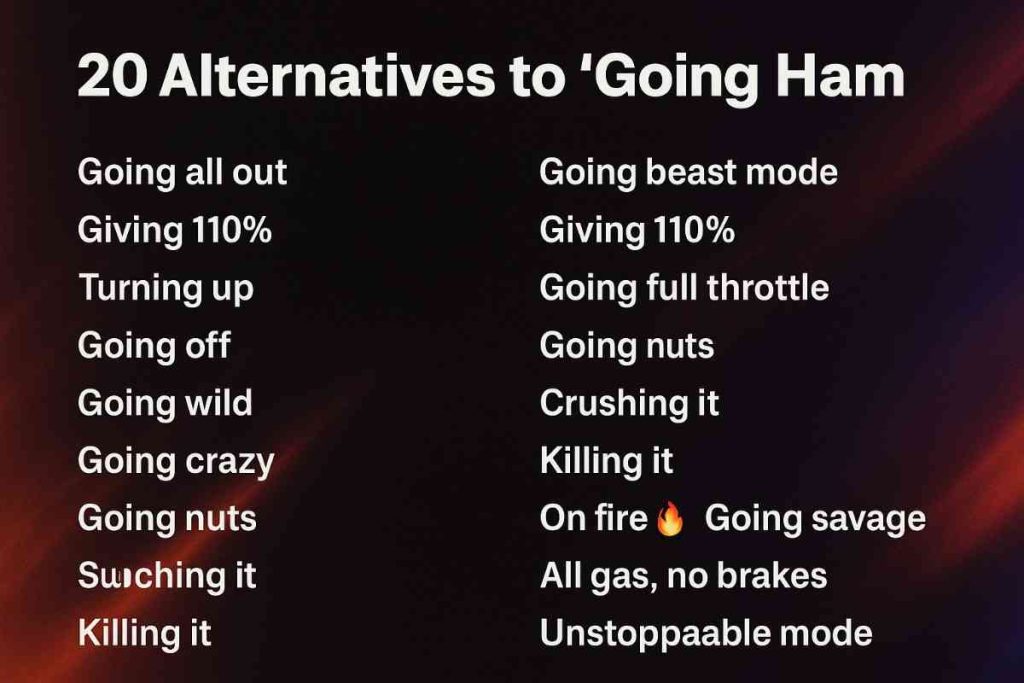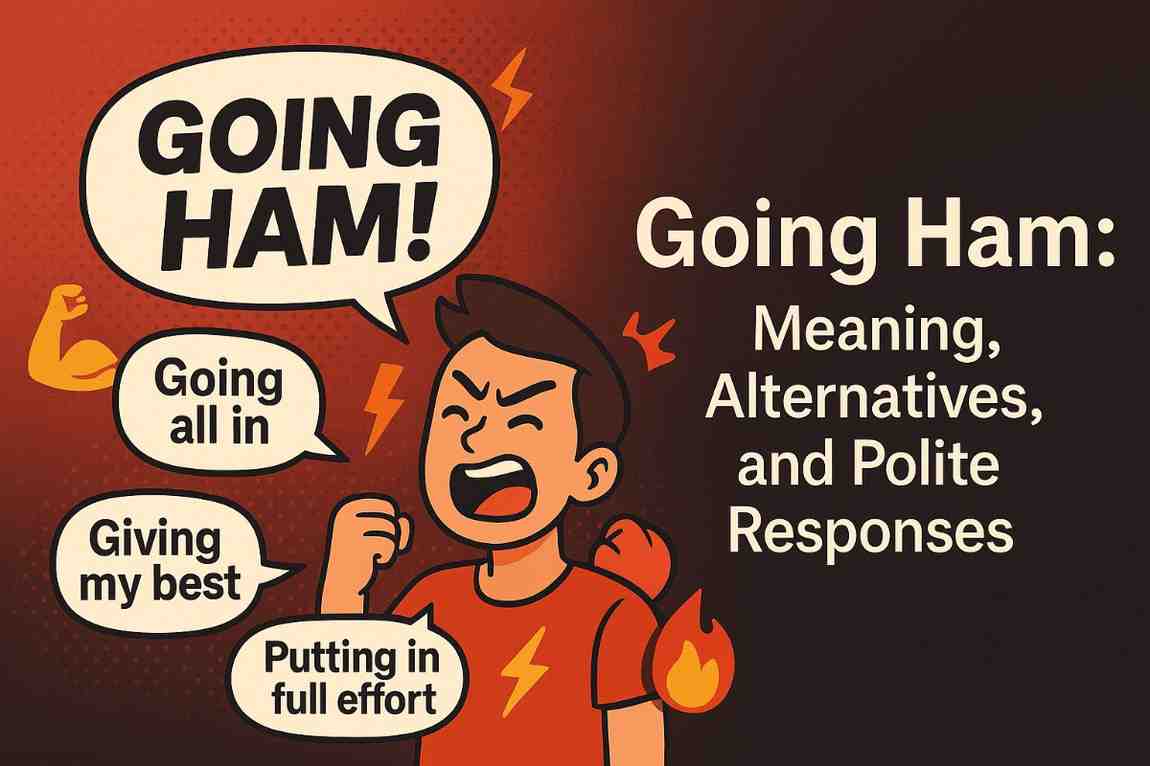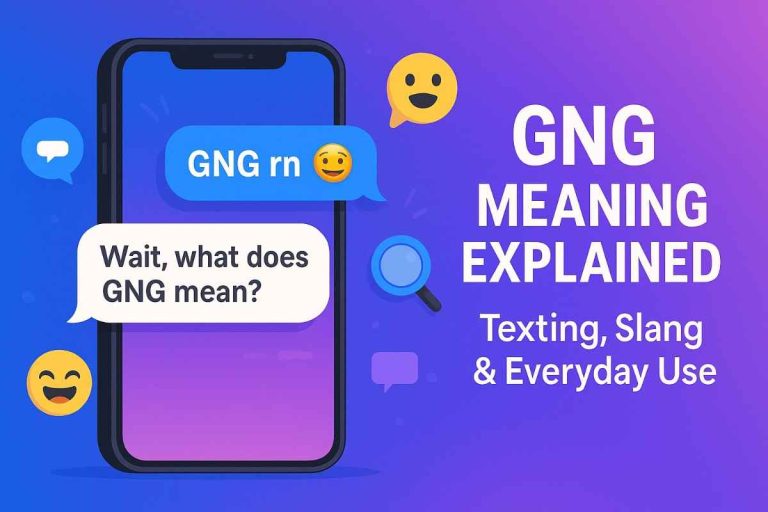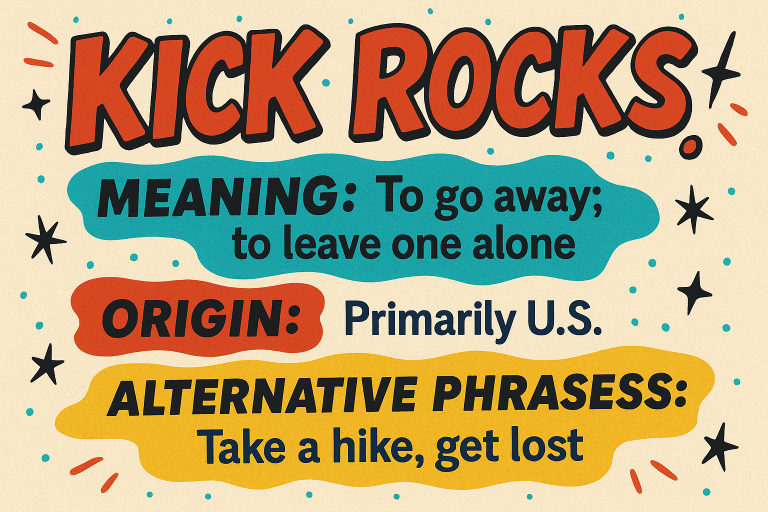Going Ham: Meaning, Alternatives, and Polite Responses
Ever heard someone say they were “going ham” on a project or task? Maybe you saw it in a text, tweet, or during a heated debate. It’s one of those slang phrases that pops up everywhere—from social media to office banter. But not everyone knows what it means or when to use it.
In professional settings, it’s also good to know cleaner or more formal ways to say the same thing. This guide explains what “going ham” means, when to use it, and gives you 20 professional alternatives. We also cover simple and polite responses when someone uses the phrase.
What Does “Going Ham” Mean?
“Going ham” means to put all your energy into something. You go all out, with no holding back. It’s like flipping a switch and going full throttle.
The term “ham” is slang for “hard as a mother—” (you get the idea). It started in hip-hop culture and caught on fast, especially online.
People use it to describe intense effort, anger, or action. If someone says, “He went ham in the meeting,” it means he spoke loudly, passionately, or maybe even aggressively.
When to Use “Going Ham”
Use “going ham” in casual settings. Think texting friends, gaming, or chatting on social media. It works when you’re describing something wild, funny, or full of energy.
But avoid it in formal emails, business presentations, or interviews. It may sound too informal—or worse, unprofessional.
Examples of when it works:
- Telling your friend how hard you crushed your workout.
- Describing how someone ranted in a group chat.
- Laughing about how your dog went crazy at the park.
You may like this – GNG Meaning Explained: Texting, Slang & Everyday Use

20 Alternatives to “Going Ham”
Below are polished substitutes for “going ham.” Each fits a different tone—some are strong, some softer. Choose the one that matches your setting.
1. Going All In
Meaning: Committing fully
Explanation: You’re not holding back; you’re invested.
Example: She went all in on the new marketing strategy.
Best Use: Workplace, goal setting, project launches
2. Putting in 110 Percent
Meaning: Extreme effort
Explanation: You gave it more than expected.
Example: The team put in 110 percent this quarter.
Best Use: Reports, reviews, praise
3. Going All Out
Meaning: Doing something with full effort
Explanation: You gave it everything you had.
Example: He went all out to win the client.
Best Use: Sales, events, projects
4. Giving It Your All
Meaning: Trying your hardest
Explanation: You gave total effort.
Example: She gave it her all during the campaign.
Best Use: Speeches, feedback, interviews
5. Taking It to the Next Level
Meaning: Improving something a lot
Explanation: You didn’t settle; you pushed further.
Example: They took customer service to the next level.
Best Use: Reports, product launches
6. Showing Intensity
Meaning: Acting with focus or passion
Explanation: You were serious and fully engaged.
Example: He showed real intensity during the debate.
Best Use: Professional discussions, reviews
7. Going Full Force
Meaning: Applying maximum power or effort
Explanation: You didn’t hold anything back.
Example: They went full force on the new rollout.
Best Use: Corporate meetings, project recaps
8. Going Off Script
Meaning: Acting spontaneously or boldly
Explanation: You did something unplanned and bold.
Example: She went off script and won over the crowd.
Best Use: Public speaking, team reflections
9. Charging Ahead
Meaning: Moving forward with confidence
Explanation: You pushed through without fear.
Example: They charged ahead despite the risks.
Best Use: Strategic planning, leadership
10. Going Overboard
Meaning: Doing too much
Explanation: You pushed past what was needed.
Example: He went overboard with his reaction.
Best Use: Cautionary tales, feedback
11. Taking It Seriously
Meaning: Acting with care and effort
Explanation: You treated it with full attention.
Example: She took her new role seriously.
Best Use: Management, onboarding
12. Getting Fired Up
Meaning: Getting excited or energized
Explanation: You got pumped and ready to go.
Example: The team got fired up after the pep talk.
Best Use: Motivational speech, training
13. Giving 100% Effort
Meaning: Trying as hard as possible
Explanation: No shortcuts or laziness.
Example: He gave 100% effort from day one.
Best Use: Job reviews, coaching
14. Losing Their Cool
Meaning: Getting too emotional
Explanation: Letting feelings take over.
Example: She lost her cool during the call.
Best Use: Conflict descriptions, HR conversations
15. Taking Charge
Meaning: Leading with strength
Explanation: You stepped up with action.
Example: He took charge of the situation.
Best Use: Leadership, performance reviews
16. Crushing It
Meaning: Doing something really well
Explanation: You nailed it.
Example: The intern crushed the presentation.
Best Use: Praise, informal feedback
17. Owning It
Meaning: Taking full responsibility
Explanation: You stepped up and claimed your role.
Example: She owned the mistake and fixed it fast.
Best Use: Accountability, team meetings
18. Delivering Big Time
Meaning: Achieving major results
Explanation: You went beyond expectations.
Example: He delivered big time on the deadline.
Best Use: Wrap-ups, executive summaries
19. Making Waves
Meaning: Causing a stir or getting noticed
Explanation: Your actions stood out.
Example: The ad campaign made waves online.
Best Use: Marketing, branding
20. Going the Extra Mile
Meaning: Doing more than expected
Explanation: You went above the call of duty.
Example: She went the extra mile to please the client.
Best Use: Recognition, team shout-outs
Simple and Polite Responses to “Going Ham”
If someone says they “went ham,” you don’t have to match their slang. Here are ways to reply that keep things friendly, simple, or professional:
1. “Wow, sounds intense!”
2. “You really gave it your all.”
3. “That’s one way to handle it.”
4. “Hope it paid off!”
5. “You must’ve been fired up!”
6. “I can tell you were all in.”
7. “Nice—sounds like a big push.”
8. “Sounds like you went all out.”
9. “Bet that took a lot of energy.”
10. “That’s real dedication.”
Each response keeps the tone light. You avoid matching the slang if it feels out of place.
Conclusion
“Going ham” has a lot of energy behind it. It tells people you’re all in, no filter, full throttle. Still, slang has limits—especially in business or formal talks.
That’s why it’s smart to know other ways to say it. Whether you’re praising a teammate or talking about your own effort, the right words help you sound clear and professional.
So next time someone “goes ham,” you’ll know what they mean—and maybe have a smoother way to say it yourself.

A former editor and grammar geek, David Langford has spent years refining the art of clear communication. He combines his journalism background with a knack for teaching, offering straightforward tips to master tricky grammar rules. When he’s not proofreading, he’s probably debating Oxford commas.







